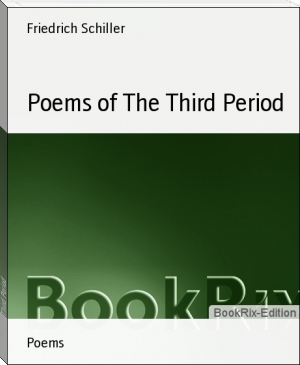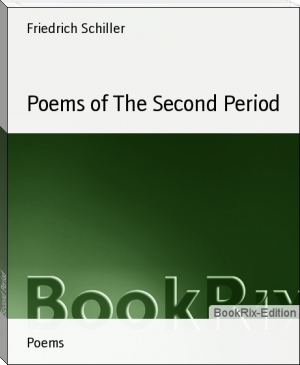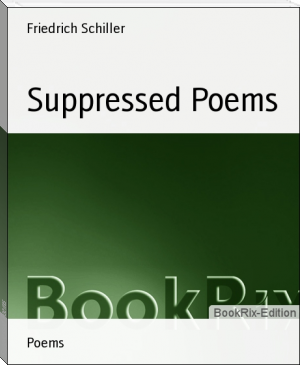Poems of The Third Period by Friedrich Schiller (the beginning after the end novel read .txt) 📖

- Author: Friedrich Schiller
Book online «Poems of The Third Period by Friedrich Schiller (the beginning after the end novel read .txt) 📖». Author Friedrich Schiller
Millions busily toil, that the human race may continue;
But by only a few is propagated our kind.
Thousands of seeds by the autumn are scattered, yet fruit is engendered
Only by few, for the most back to the element go.
But if one only can blossom, that one is able to scatter
Even a bright living world, filled with creations eterne.
THE ANIMATING PRINCIPLE.
Nowhere in the organic or sensitive world ever kindles
Novelty, save in the flower, noblest creation of life.
TWO DESCRIPTIONS OF ACTION.
Do what is good, and humanity's godlike plant thou wilt nourish;
Plan what is fair, and thou'lt strew seeds of the godlike around.
DIFFERENCE OF STATION.
Even the moral world its nobility boasts - vulgar natures
Reckon by that which they do; noble, by that which they are.
WORTH AND THE WORTHY.
If thou anything hast, let me have it, - I'll pay what is proper;
If thou anything art, let us our spirits exchange.
THE MORAL FORCE.
If thou feelest not the beautiful, still thou with reason canst will it;
And as a spirit canst do, that which as man thou canst not.
PARTICIPATION.
E'en by the hand of the wicked can truth be working with vigor;
But the vessel is filled by what is beauteous alone.
TO - -
Tell me all that thou knowest, and I will thankfully hear it!
But wouldst thou give me thyself, - let me, my friend, be excused!
TO - -
Wouldst thou teach me the truth? Don't take the trouble! I wish not,
Through thee, the thing to observe, - but to see thee through the thing.
TO - -
Thee would I choose as my teacher and friend. Thy living example
Teaches me, - thy teaching word wakens my heart unto life.
THE PRESENT GENERATION.
Was it always as now? This race I truly can't fathom.
Nothing is young but old age; youth, alas! only is old.
TO THE MUSE.
What I had been without thee, I know not - yet, to my sorrow
See I what, without thee, hundreds and thousands now are.
THE LEARNED WORKMAN.
Ne'er does he taste the fruit of the tree that he raised with such trouble;
Nothing but taste e'er enjoys that which by learning is reared.
THE DUTY OF ALL.
Ever strive for the whole; and if no whole thou canst make thee,
Join, then, thyself to some whole, as a subservient limb!
A PROBLEM.
Let none resemble another; let each resemble the highest!
How can that happen? let each be all complete in itself.
THE PECULIAR IDEAL.
What thou thinkest, belongs to all; what thou feelest, is thine only.
Wouldst thou make him thine own, feel thou the God whom thou thinkest!
TO MYSTICS.
That is the only true secret, which in the presence of all men
Lies, and surrounds thee for ay, but which is witnessed by none.
THE KEY.
Wouldst thou know thyself, observe the actions of others.
Wouldst thou other men know, look thou within thine own heart.
THE OBSERVER.
Stern as my conscience, thou seest the points wherein I'm deficient;
Therefore I've always loved thee, as my own conscience I've loved.
WISDOM AND PRUDENCE.
Wouldst thou, my friend, mount up to the highest summit of wisdom,
Be not deterred by the fear, prudence thy course may deride
That shortsighted one sees but the bank that from thee is flying,
Not the one which ere long thou wilt attain with bold flight.
THE AGREEMENT.
Both of us seek for truth - in the world without thou dost seek it,
I in the bosom within; both of us therefore succeed.
If the eye be healthy, it sees from without the Creator;
And if the heart, then within doubtless it mirrors the world.
POLITICAL PRECEPT.
All that thou doest is right; but, friend, don't carry this precept
On too far, - be content, all that is right to effect.
It is enough to true zeal, if what is existing be perfect;
False zeal always would find finished perfection at once.
MAJESTAS POPULI.
Majesty of the nature of man! In crowds shall I seek thee?
'Tis with only a few that thou hast made thine abode.
Only a few ever count; the rest are but blanks of no value,
And the prizes are hid 'neath the vain stir that they make.
THE DIFFICULT UNION.
Why are taste and genius so seldom met with united?
Taste of strength is afraid, - genius despises the rein.
TO A WORLD-REFORMER.
"I Have sacrificed all," thou sayest, "that man I might succor;
Vain the attempt; my reward was persecution and hate."
Shall I tell thee, my friend, how I to humor him manage?
Trust the proverb! I ne'er have been deceived by it yet.
Thou canst not sufficiently prize humanity's value;
Let it be coined in deed as it exists in thy breast.
E'en to the man whom thou chancest to meet in life's narrow pathway,
If he should ask it of thee, hold forth a succoring hand.
But for rain and for dew, for the general welfare of mortals,
Leave thou Heaven to care, friend, as before, so e'en now.
MY ANTIPATHY.
I have a heartfelt aversion for crime, - a twofold aversion,
Since 'tis the reason why man prates about virtue so much. "What! thou hatest, then, virtue?" - I would that by all it were practised,
So that, God willing, no man ever need speak of it more.
ASTRONOMICAL WRITINGS.
Oh, how infinite, how unspeakably great, are the heavens!
Yet by frivolity's hand downwards the heavens are pulled!
THE BEST STATE.
"How can I know the best state?"
In the way that thou know'st the best woman;
Namely, my friend, that the world ever is silent of both.
TO ASTRONOMERS.
Prate not to me so much of suns and of nebulous bodies;
Think ye Nature but great, in that she gives thee to count?
Though your object may be the sublimest that space holds within it,
Yet, my good friends, the sublime dwells not in the regions of space.
MY FAITH.
Which religion do I acknowledge? None that thou namest.
"None that I name? And why so?" - Why, for religion's own sake?
INSIDE AND OUTSIDE.
God alone sees the heart and therefore, since he alone sees it,
Be it our care that we, too, something that's worthy may see.
FRIEND AND FOE.
Dearly I love a friend; yet a foe I may turn to my profit;
Friends show me that which I can; foes teach me that which I should.
LIGHT AND COLOR.
Thou that art ever the same, with the changeless One take up thy dwelling!
Color, thou changeable one, kindly descends upon man!
GENIUS.
Understanding, indeed, can repeat what already existed, -
That which Nature has built, after her she, too, can build.
Over Nature can reason build, but in vacancy only:
But thou, genius, alone, nature in nature canst form.
BEAUTEOUS INDIVIDUALITY.
Thou in truth shouldst be one, yet not with the whole shouldst thou be so.
'Tis through the reason thou'rt one, - art so with it through the heart. Voice of the whole is thy reason, but thou thine own heart must be ever;
If in thy heart reason dwells evermore, happy art thou.
VARIETY.
Many are good and wise; yet all for one only reckon,
For 'tis conception, alas, rules them, and not a fond heart.
Sad is the sway of conception, - from thousandfold varying figures,
Needy and empty but one it is e'er able to bring.
But where creative beauty is ruling, there life and enjoyment
Dwell; to the ne'er-changing One, thousands of new forms she gives.
THE IMITATOR.
Good from the good, - to the reason this is not hard of conception;
 The unity of form and content is what distinguishes poetry from other areas of creativity. However, this is precisely what titanic work implies.
The unity of form and content is what distinguishes poetry from other areas of creativity. However, this is precisely what titanic work implies. 




Comments (0)